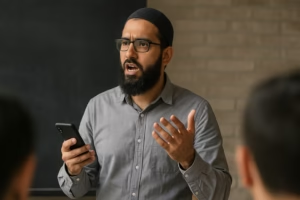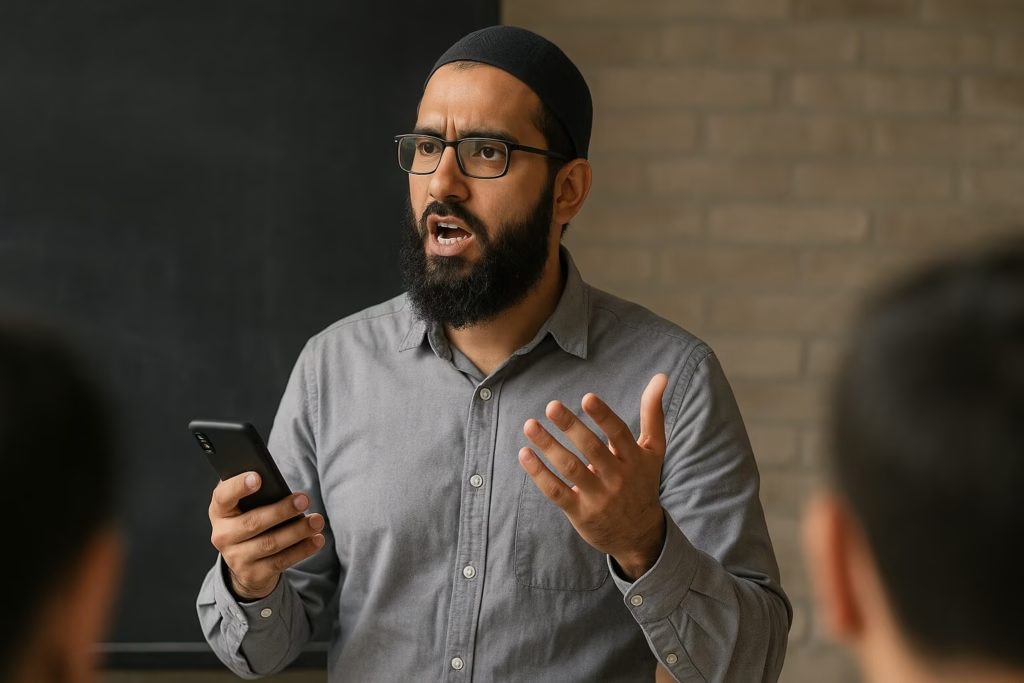You may be sincere. You may even be right. But if you mislead someone due to a lack of proper study, you’re still accountable. Your understanding of a particular topic might differ — and that’s okay. Just don’t impose it on others as the only truth.
Ever sat in a barber’s chair and prayed silently, “Hope he gives me a cool and haircut and not a cultural one?”
Well, maybe you haven’t. But the risk is real when your barber skipped hair school and learned off YouTube.
Now imagine letting someone engineer your understanding of Islam — using the same DIY methods.
The Islam Influencer Next Door
We live in a world where a person like an engineering degree and YouTube Islamic lecture reels under his belt suddenly thinks he’s qualified to be a mufti at the family BBQ.
You’ve probably met this person. Maybe you’ve been this person (gulp).
He quotes Qur’an ayahs, drops hadith like he’s building a circuit board, and gives fatwas with all the confidence of a structural engineer. Better still, referring to an important scholar, who might have made it just to make a point of view on a particular topic.
But here’s the catch: just because you’re trained in one discipline doesn’t make you a qualified specialist in another. You don’t ask your dentist to do your taxes. So why are we asking engineers and lawyers to explain Islamic rulings on nikah, inheritance, or zakat just because they “read up online”?
Barbers vs Hair Stylists: Same Job, Different Skills
Let’s break it down with something close to the head: hair.
Barbers and hair stylists both cut hair. But guess what? One trained for a few weeks, the other trained for years, practiced on mannequins, studied color science, scalp health, trends, and has a certificate to prove it. You’re going to pay the stylist more because — naturally — you trust the one who put in the work. And obviously, we trust the hair stylists more when going for important events or due to hair medical reasons for advice rather than a barber.
The same logic applies to Islamic knowledge. Social media scholars are like unlicensed barbers — they might clean you up nicely sometimes, but if they nick your deen in the wrong place, who’s accountable?
What about certified scholars in the media?
Well, yes — they may be trained, but Islamic rulings can still differ based on region, madhhab, and how foundational texts were understood by the early generations. The Sahabah (companions of the Prophet ﷺ) themselves sometimes held differing views based on context, location, and interpretation.
Let’s look at a few examples:
1. Combining Prayers While Travelling
- Hanafi School: Doesn’t permit combining Dhuhr–Asr or Maghrib–Isha unless there’s extreme necessity (like Hajj).
- Shafi’i, Maliki, Hanbali Schools: Permit combining prayers when travelling, even without extreme hardship.
Why the difference?
Some companions like Ibn Abbas permitted it for ease (Sahih Muslim), while others like Abdullah ibn Mas’ud restricted it to necessity.
🔗 SeekersGuidance – Differences in Combining Prayers
2. Eid Qurban (Udhiyah) — Cutting Hair/Nails Before Sacrifice
- View 1 (Hanbali, based on Hadith of Umm Salamah): One should avoid cutting hair and nails from 1st Dhul Hijjah until after the qurbani is done.
- View 2 (Hanafi/Maliki): This is a recommendation, not obligatory.
➡️ Why the difference?
Some companions acted strictly on the hadith, others understood it as a preferred action rather than a command.
- Advise from Dr Omar Suleiman -Why it is ok! Click to read more
- Why is it haram to do so? Click to read more
Referring to the links above, we can see, there are supporting hadiths that were understood differently even during the time of Prophet Muhammad ﷺ, and the Sahabah themselves held varying interpretations. So, is it really right to tell someone not to follow a hadith explanation simply because it differs from your understanding?
Trust Your Local Imam (Yes, Even the One with the trimmed Beard)
Islam is not a one-size-fits-all religion. While the principles remain universal, jurisprudence (fiqh) often differs from one country or school of thought to another, rooted in local context, tradition, and scholarship.
You want to understand Islam better? Start with your community teachers — the ones who understand your social, economic, and legal environment. Then explore further with qualified teachers outside, not the other way around.
You don’t start medical school by dissecting a brain — you begin with the basics, like the nervous system and first aid.
Islam is no different. It’s deep, layered, and best approached step by step — not skipped and stitched together through viral clips and Google searches.
The Prophet ﷺ said:
“Whoever is given a fatwa without knowledge, his sin is upon the one who gave the fatwa.”
(Abu Dawud)
Scenario: The Engineer Who Became an Islamic YouTuber
Meet Omar. He’s a top-tier civil engineer. He builds bridges, calculates load-bearing ratios, and loves watching Mufti YouTube™ while commuting.
Over time, he confidently starts explaining Islamic finance to his colleagues.
Next BBQ, he schools his cousin on why her nikah might be invalid. And at a wedding, he warns the groom about shaving his beard before Eid.
Sure, he’s read the ayahs, understood the logic, and even memorized hadith numbers. But let’s ask:
If someone took a few online courses in engineering and tried building a bridge, would Omar let his family drive on it?
If not, then why are we letting people drive their souls across bridges they built with incomplete Islamic knowledge?
The Ego & the Afterlife
Allah warns us in the Qur’an:
“And do not pursue that of which you have no knowledge. Indeed, the hearing, the sight, and the heart — about all those [one] will be questioned.”
(Qur’an 17:36)
Remember, it takes two hands to clap — meaning there are often at least two valid opinions in Islamic jurisprudence. Before you insist on one view, take the time to explore the scholarly spectrum. You might be surprised to find that difference of opinion is not only tolerated in Islam — it’s built into the tradition.
Islam isn’t about how confident you sound. It’s about how correctly you understand — and whether you were qualified to pass that understanding on.
Final Thoughts: Enroll Before You Enlighten
Before you try to “engineer” someone’s Islam, ask yourself:
- Have I studied with qualified scholars?
- Do I know the context behind what I’m quoting?
- Am I open to the fact that there could be more than one valid opinion?
- Why are the community Imams’ views being crucial than you? (This will be another blog posts coming soon)
Islam isn’t hard. But it’s deep. Like engineering, medicine, or yes — hairstyling — you need to go through the training, not just skim the highlights.
So the next time you feel the urge to educate your friend about fiqh during lunch break — maybe first book yourself in for some knowledge rehab.
And if you still want to cut hair?
At least go get licensed first.


